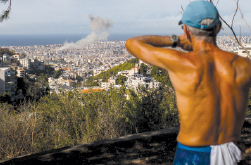
A Lebanese civilian gazes across Beirut as smoke billows in the backdrop on Sunday, Nov. 17, 2024. (Diego Ibarra Sanchez/The New York Times)
By ISABEL KERSHNER, EUAN WARD and HWAIDA SAAD
An Israeli airstrike struck the Lebanese capital on Sunday, marking an unusual assault within the city, which follows Israel’s military bombardment of areas outside where Hezbollah dominates.
Israel’s escalated military efforts seem focused on compelling the Lebanese government and Hezbollah to accept cease-fire terms negotiated between Israeli and U.S. officials, which Israeli analysts refer to as a tactic of “negotiations under fire.”
According to Lebanon’s Health Ministry, one individual was killed in the strike on Beirut — the first that has impacted the city in weeks. Previous rare attacks in the capital usually targeted members of Hezbollah, and the assault on Sunday reportedly resulted in the death of Mohammed Afif, the head of Hezbollah’s media bureau.
As Hezbollah’s unofficial spokesperson, Afif was among the group’s handful of prominent public figures. His profile had risen significantly in recent weeks after Israel eliminated Hezbollah’s leader, Hassan Nasrallah, in September, alongside much of the group’s senior command and leadership.
The airstrike in Beirut on Sunday demolished a seven-story structure in the Ras al-Naba area, as reported by Lebanon’s state-run news agency. It mentioned that rescue teams were working to save several individuals trapped beneath the debris and that Afif was “coincidentally present” when the building was struck.
That building also served as the Lebanese headquarters for the Arab Socialist Baath party, a small political faction that aligns with Hezbollah. The party released a statement confirming that its leader, Ali Hijazi, was not inside the building during the strike.
Hijazi acknowledged Afif’s death on social media, sharing a photo of himself seated next to Afif and captioning it: “May God have mercy on you, dear brother, cherished fighter… You knew you would join the ranks of martyrs.”
The blast triggered chaos and distress throughout the city. Residents rushed into the streets, some screaming, while others tried to contact loved ones by phone. Smoke and dust enveloped the area as gunfire echoed and multiple ambulances sped to the scene, gathering a crowd.
Um Ahmad, using only her first name, stood in front of the building with her three young daughters huddled behind her. She recounted that she, her husband, and their six children were staying in a nearby apartment alongside many others displaced by the conflict. When they heard the explosion, they hurried out of their building, terrified.
“We heard a loud noise and left immediately,” she stated.
There was no immediate response from the Israeli military regarding the strike in Beirut. Earlier on Sunday, the Israeli military reported conducting “intelligence-based strikes” against Hezbollah in the Dahiya, an area just south of Beirut where the militant group has influence. A spokesperson for the Israeli military, Avichay Adraee, noted that Israel had targeted 50 locations in that area over the past week.
Abu Hussein had escaped the Dahiya and started working as a security guard in a Beirut building just a few weeks prior. The building he worked in was the one struck on Sunday.
Following the strike, Hussein stood nearby in a state of shock. His head was wrapped in a bandage, with blood streaks dripping down his neck.
“The building was almost empty” when the strike occurred, Hussein recounted as medics treated his injuries.
Afif had made recent public appearances, addressing reporters during news briefings in the Dahiya. At one such briefing last month, Afif claimed responsibility for an aerial strike that targeted Israeli Prime Minister Benjamin Netanyahu’s residence. As warnings of an impending strike caused journalists to hastily gather their gear and leave, Afif reassured them, saying, “The bombardments do not intimidate us, so why should the threats?”
A week ago, Afif mentioned in a press conference that Hezbollah had yet to receive any formal cease-fire proposal, but noted there had been ongoing “contacts between Washington, Moscow, Tehran, and other capitals” regarding the matter since the election of former President Donald Trump.
Hezbollah, he emphasized, was still “prepared for a prolonged conflict.”
Israel launched an intensified military campaign against Hezbollah in September, nearly a year after the group began firing rockets into Israel in solidarity with Hamas in the Gaza Strip. This offensive has triggered a humanitarian crisis in Lebanon, displacing nearly a quarter of its population and overwhelming the country’s healthcare system.
The campaign targeting Hezbollah originally centered on southern Lebanon, where Israel’s military aimed to prevent the group from firing rockets over the border. However, military actions have broadened in recent weeks to encompass cities and towns throughout the country, including areas far from the border. Meanwhile, Hezbollah has continued to maintain its ability to launch rockets into Israel.
On Sunday, the Israeli military reported that approximately 20 rockets had been fired into its territory from Lebanon, triggering alert sirens in the vicinity of Haifa, Israel’s main northern port city, and other locations. Some rockets were intercepted by Israel’s air defense systems, while others landed in uninhabited areas. No immediate casualties were reported.
